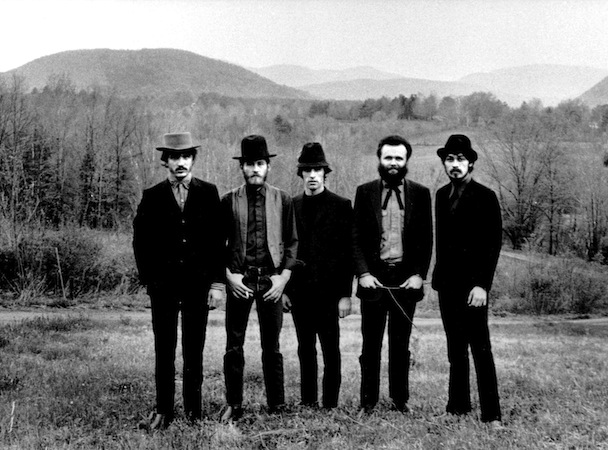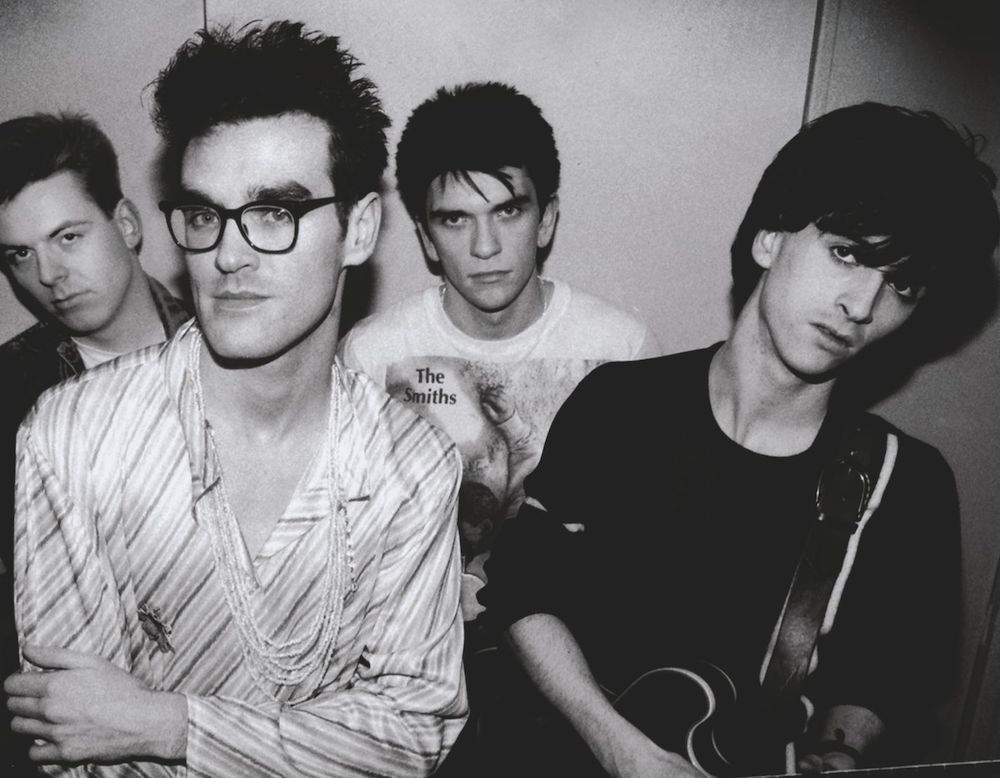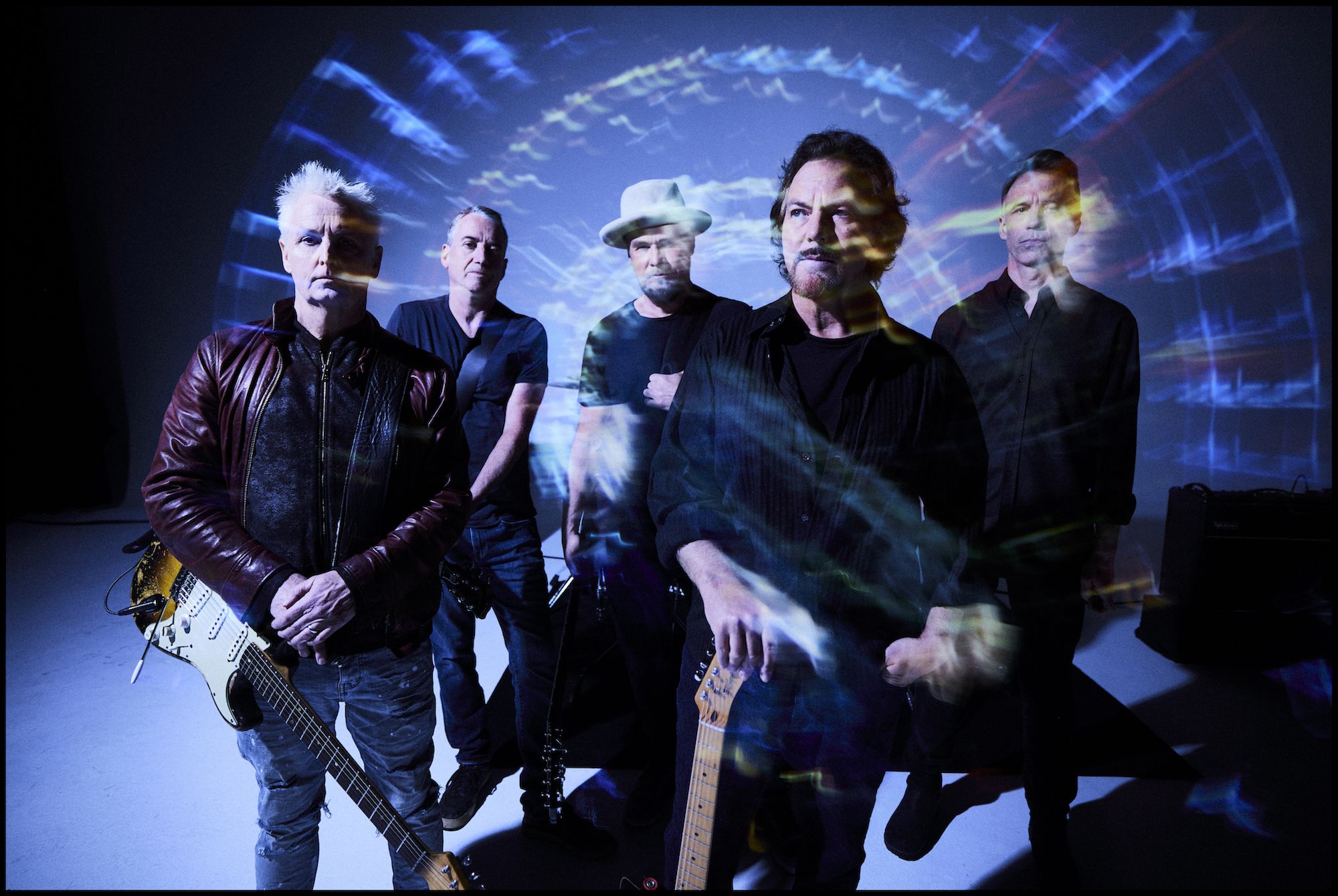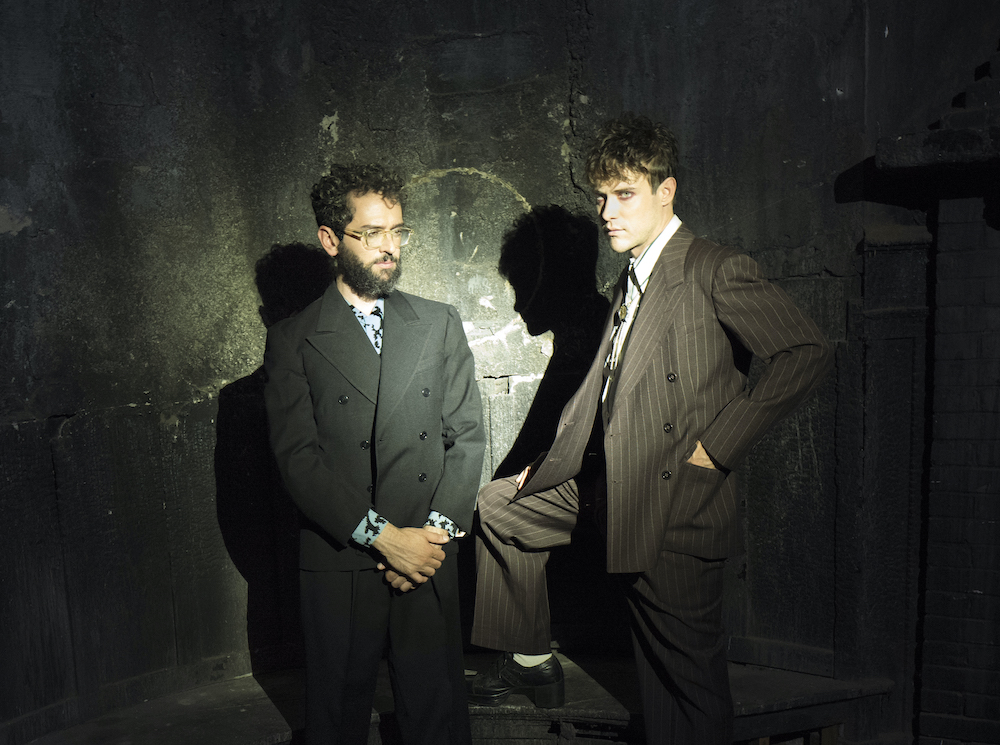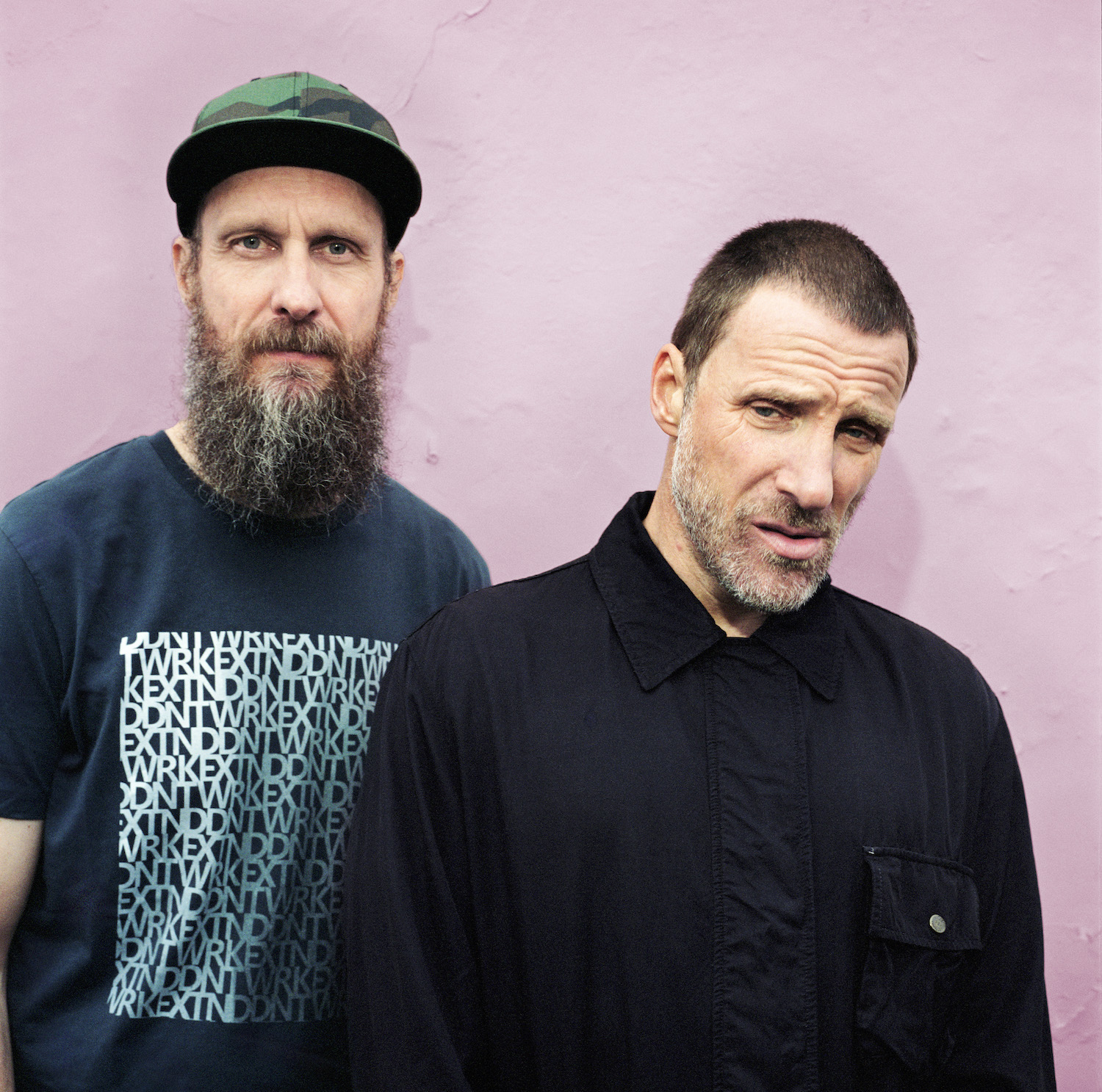The Band has a deserved reputation as one of the true oracles of American music at its essence -- their seamless distillation of blues, jazz, folk, country, rockabilly, and soul can tell a 200-year musical saga in a span of one 4-minute song. But the story of the group itself and the inimitable individuals who formed its ranks has more in common with a 19th century Russian novel: epic, historical, and mainly tragic. The haunting beauty of their finest work exudes a kind of sweeping, panoramic melancholy, which for all of its beauty can be almost too difficult to listen to. Their confederate and key collaborator Bob Dylan once lamented in song that "death kept following us/ tracking us down," as appropriate an epitaph as any for this extraordinary, star-crossed group of musical greats.
First formed in the late '50s as the backing backing band to the Texas rockabilly badass Ronnie Hawkins -- the pairing of the Canadian-born musicians Robbie Robertson, Garth Hudson, Richard Manuel, and Rick Danko with the Arkansas native Levon Helm proved as fortuitous as it was unlikely. A collection of peerless musicians with jazz skills and roots instincts, they honed their craft backing Hawkins in juke joints and small halls for nearly five years, and then had their first fateful experience as Bob Dylan's backup band on his 1965 US tour. This was the early watershed moment in which Dylan, the anointed savior of the folk scene, had "gone electric" and ostensibly turned his back on a large portion of his weirdly possessive fan base.
If the idea that Dylan's decision to play electric music rendered him a sellout or even a "Judas" seems totally absurd in retrospect (and surely it was absurd at the time) it remains important to note the unapologetically dissonant, high-voltage nature of the music he and the Band were playing at that moment. Little wonder that startled and even frightened fans were moved to boo lustily from Shea Stadium to the Royal Albert Hall. A decade and change later, mainstream audiences were still baffled and appalled when the Sex Pistols came forward with a similar eye toward chaos and called it punk rock.
By the time they were creating music entirely on their own, the Band was an old group of young men. Years on the road had burnished a continuity of sound and a sense of purpose that immediately yielded the instant classics Music From Big Pink in 1968 and the equally wonderful self-titled album The Band in 1969. Later releases like Stage Fright and the stunning, underrated Northern Lights - Southern Cross from 1975 exemplified the savant-like skills of a group that played together with omniscient ability. Few outfits have ever measured up to the Band at their peak: that short list might include the first Miles Davis Quartet, Elvis Presley's TCB Band, James Brown's the JB's, and NRBQ at the height of their powers.
The irony of their magisterial greatness was captured only too adroitly by a young Martin Scorsese in his 1978 concert film The Last Waltz, which chronicled the group playing in its original lineup for the final time at San Francisco's Winterland Ballroom in 1976. Joined by luminaries like Muddy Waters, Bob Dylan, Neil Young, Joni Mitchell, and Dr. John, the group never sounded more incandescent. But juxtaposed with behind-the-scenes interviews, you see men terribly frayed by a lifetime turning rock and roll's endless trick. "It's a goddamn impossible way of life," Robbie Robertson avers, looking close enough to death to take him at his word.
The Last Waltz was functionally the end of the Band, although members would periodically reconvene in various permutations throughout the '70s and '80s, always without Robertson. Manuel committed suicide in 1986 after a gig in Florida. Danko’s demise followed in 1999, dead of "drug related heart failure," whatever that means. Last year, Levon Helm finally succumbed to a long-running battle with throat cancer, which finally silenced one of the most perfect voices that ever graced the tradition. It’s perhaps no surprise that the newly released (and critically acclaimed) documentary about Helm is titled Ain’t In It For My Health.
There is a sadness that gathers around the story of the Band, but also a sense of triumph. No one ever did it better or at such great cost. The weight, it transpires, was simply too onerous. With The Last Waltz 35 years old as of last week, and Ain't In It For My Health in theaters now, it's an apt moment to cull and discuss the very best songs from one of America's very best rock groups.
10. "Stage Fright" (From Stage Fright, 1970)
The infectious, semi-autobiographical "Stage Fright" is an addicting plea to an audience that has become accustomed to the phenomenally extroverted performances of a group with the temerity to term themselves THE Band. Rarely has the push and pull of performance anxiety been articulated so forcefully -- here the man with the stage fright suffers through every moment of his on-stage presentation, only to wish it could start all over again. A brilliant track in which the psychology of the compulsive performer is measured beneath a discerning microscope, with results only too elucidating.
9. "Twilight" (From Twilight Single, 1975)
One of the finest songs the Band ever rendered was something of an orphan, appearing first as a single and often included on group compilations. Nature figures prominently in many of the Band's best songs, often depicted with a conflicted combination of love, awe, and terror. It is also most often a place of terrible isolation -- a seeming reflection of the open road that is the closest thing the group had to a home. On this track Danko begs his lover not to leave him alone in the twilight, seemingly assured that the beauty of that "loneliest time of day" will undo him to treacherous effect. In the world of the Band, ugliness can mean salvation and beauty can be the most terrible thing to behold.
8. "The Shape I’m In" (From Stage Fright, 1970)
Both musically and thematically, the Band were masters of nuance, and Richard Manuel's wry, telling vocal on "The Shape I'm In" is a perfect example -- here he brings a nearly winsome air to this otherwise harrowing tale of complete physical and emotional dissolution. Abetted by a bouncing rhythm track and soul-inflected organ, this is the sound of the group barreling headlong toward oblivion, gallows humor fully intact. "Out of nine lives/ I spent seven/ Now how in the world/ do you get to heaven?"
7. "Ophelia" (From Northern Lights Southern Cross, 1975)
Aided by jaunty, New Orleans-style horns and a killer vocal from Levon Helm, "Ophelia" is the kind of unequaled, loose-limbed jam that the Band made sound easy, but few others could ever pull off. One of the group's mesmerizing conjurer's tricks is the ability to make a song move like lightning, while never seeming to be in any sort of rush themselves as players. That's the magic of the groove, and "Ophelia" has a great one.
6. "Whispering Pines" (From The Band, 1969)
Like a gorgeous Northern cousin to Gram Parson's "Hickory Wind," the yearning "Whispering Pines" is one of the most intense and transporting four minutes in the history of the folk and rock tradition. Manuel's lead vocals are stunning -- somehow conveying a complex cocktail of vulnerability, hurt, and aspirational wonder that conveys the song's central message about the awesome loneliness of life and nature. By the time he begins trading lines with Helm, "Whispering Pines" takes on the character of the most powerful devotional music. A visionary track possessed of an almost overpowering emotional pull.
5. "Up On Cripple Creek" (From The Band, 1969)
A delightful hobo's travelogue, "Up On Cripple Creek" is the Band at their most convivial and comic, wedding an unforgettable melody to the musings of a thoroughly debauched narrator with an infectious lust for life. Helm's vocals are a masterpiece of comic timing and light touch -- he sings in the conversational manner of the world's most entertaining drunk -- spinning tales of racetracks and liquor shacks that make little sense, but can't help but bring a smile. One of the more amusing earnest love songs in the entire rock tradition, the object of the singer's affection is Bessie -- an ideal mate who is always willing to nurse the singer back to health after a long bender: "A drunkard's dream if I ever did see one." Proof that the Band can be as funny as they are moving.
4. "Acadian Driftwood" (From Northern Lights Southern Cross, 1975)
In the beautiful, moving "Acadian Driftwood," Robertson tells the sad story of the French Acadians who were expelled from Canada by the British during the French and Indian war. "They signed a treaty/ And our homes were taken/ Loved ones forsaken/ They didn’t give a damn." Danko, Manuel, and Helm all take a turn singing the verses, telling this heartbreaking tale of loss, alienation, and homesickness, giving voice to a people who didn’t have any say in their ultimate fate.
3. "The Weight" (From Music From Big Pink, 1968)
"The Weight" is a quintessential instance of the incredible continuity between the different talents involved in the Band. It's essentially a handful of shaggy dog stories (with a literal shaggy dog in there) -- more or less a smattering of of quasi-Dylan anecdotes, which left to their own devices maybe don't amount to anything in particular, but with Levon's passionate reading and the near gospel-style arrangement, it takes on the character of something almost scriptural. It's a perfect example of the greatness of the group as a full-fledged entity elevating what might as well have been just another pop song into the exalted arena of a true spiritual classic.
2. "It Makes No Difference" (From Northern Lights Southern Cross, 1975)
The poignant centerpiece of the great Northern Lights/Southern Cross, the Danko-sung "It Makes No Difference" is an emotional cratering of such profound proportions that it can be difficult to recover from a casual listening. Detailing the living death of a narrator who has lost the love of his life, the stunningly gorgeous melody only deepens the sense of despair, as if to emphasize that there is surely beauty in the world, but it is simply inaccessible to the narrator. As the song stretches over six and a half unhurried minutes, a sense of resolution and finality takes shape, but there are no silver linings. Only the grave, if even that, can free the singer from the bondage of his sorrow. As powerful as soul music gets.
1. "The Night They Drove Old Dixie Down" (The Band, 1969)
Of the many strange mysteries that comprise the story of the Band, one of the principal ones is the manner in which they seem to exist outside the normal constraints of the time/space continuum. Although wildly popular in their own time amongst fans and critics alike, it is just as easy to imagine them as heroes of the 19th century vaudeville era, or the saloons and speakeasies of 1920s New Orleans. "The Night They Drove Old Dixie Down" is perhaps the greatest exemplar of that peculiar capacity -- a perfectly plausible Civil War-era anthem, written and released in the late 1960s, and sounding absolutely nothing like a historical recreation or rote genre exercise. As he sings of the struggles of Confederate soldier Virgil Caine during the last days of the Old South, Helm sounds more than convincing. He sounds possessed, inhabited. The melody is pitch perfect and the arrangement typically stirring, bringing to bear the many contradictory elements that have made the Band perhaps the most imitated group that no one has ever managed to sound like. The song is soaring and painfully melancholy, indignant and sorrowful, rebellious and regretful. It feels epic, but is barely three and a half minutes long. It carries you away to places of exultant happiness and terrible misery -- and then just like that, just like the group itself, it’s gone.
Listen to this playlist on Spotify
